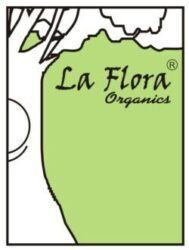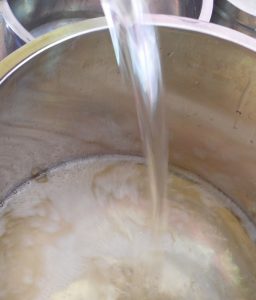
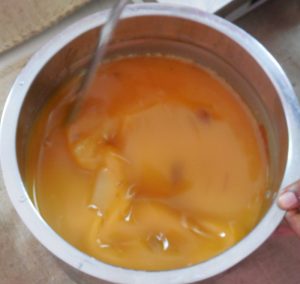
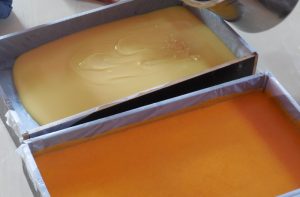
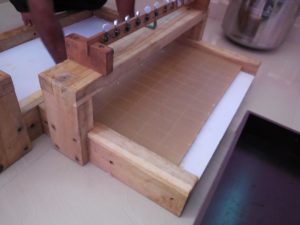
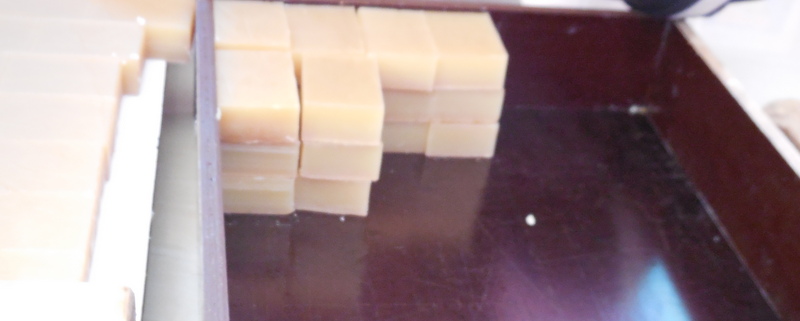
What are Cold Processed & Vegetable Soaps?
Soap is traditionally, for years made by mixing an alkali (lye/caustic) with oil or fat in a process known as saponification. This is a chemical reaction… the triglyceride oils/fats are first hydrolyzed into free fatty acids, these then combine with the alkali to form crude soap or base soap this is a mix of various soap salts, excess fat, or alkali, water, and liberated glycerol (glycerin) as this is broken off from the triglyceride during the reaction process. Glycerin is a useful by-product from soap production in commercial soap making, but in cold process soap making it is left in the soap product as a softening agent, which is what we do at La Flora Organics, utilizing the high Glycerin content for additional processing and performance benefits.
Manufactured using Vegetable Oils these soaps contain no synthetic ingredients or surfactants, they have a slightly high pH. Vegetable soap tends to be more natural and contains no synthetic or chemical ingredients.
Vegetable soaps are typically referred to as ‘true’ and ‘traditional’ soap bars. We tailor soap bar composition and performance by adjusting our fats and oils, we also introduce other additives such as Shea Butter, Cocoa Butter, clays, herbs, and essential oils as fragrances to moisturize and cleanse the skin whilst washing.
What is a Syndet?”Syndet vs Soaps”???
The vast majority of soaps available in the market today are syndets. The word “syndet” is derived from “synthetic” combined with “detergent”. Technically it refers to the binding that occurs between different detergents, also called surfactants or tension-active agents. These detergents, which have an affinity for oils and repel water, surround dirt with small structures that are then removed by water. These synthetic surfactants make syndet bars mild soap bars often called pH neutral soap bases.
Syndet bars are often marketed as “cleansing bars” or “dermatological bars” Companies will use the term “soap free” or “soaps without soap”. Most popular baby soaps in the markets are actually syndets and not Soaps as they can synthetically be made to be super mild. Syndet bars are made using blends of synthetic surfactants and formulated and produced differently than that traditional vegetable soap bars. Syndet surfactants are derived from oils, fats, or petroleum products that are processed in a wide range of chemical processes other than traditional saponification.
True Vegetable soap making like La Flora Organics soaps has been considered as one in the traditional crafts sector – a memory of a time when cosmetics were not widely used and when people used the same soap for their bodies and their clothes often made in small batches at home. There is an increasingly popular demand for Natural soap (vegetable) where oils are used as people slowly move away from chemicals, chemical processes, and surfactants widely used in Syndet manufacture.
Are “La Flora Organics” Handmade Soap Bars Natural and Vegetable based soaps?
Yes, it’s handmade using Pure Organic Veg oils, natural botanicals & healing essential Oils. It’s totally free of sulfates, parabens, foaming agents, fillers, artificial hardeners, animal fat, and synthetic colorants. Read the label on a bar of commercial soap bars. Now read the ingredients in a bar of La Flora Organics Soap Bar. You can understand it for yourself. They are 100% VEGAN, VEGETARIAN, and VEG Oil-based Soaps(100% True & Traditional Soap, sorry Syndets).
The soap bar contains “Lye” in the ingredients list. Is this not harmful to the skin & body?
In the process of soap making or Saponification, “Lye” is the alkali (sodium hydroxide)that is added to the Veg Oils and it becomes Soap & glycerine, which is the natural bye product of the process. This is how soap is made anywhere in the world. In a cold process method like ours, soap that’s made is allowed to rest for 6 weeks, letting any residue of lye completely go off from the soap and natural glycerine to remain. The result is a wonderful soap bar loaded with the goodness of Oils, herbs, and lots of natural glycerine. So though Lye is used in the making process, it doesn’t remain in the final bar. Each soap bar is carefully checked for any further residue, hand trimmed before packing.
How to best use La Flora Organics soap bar?
Apply a wet bar on your palms and gently apply it on wet skin. Work out a rich creamy lather. Rinse off and pat dry. Avoid contact with eyes. If this happens just rinse with cold water. For a long-lasting bar, leave the soap bar in a dry place or dish after each use as all cold processed soaps tend to become soft if left in water.
What are the key ingredients in Soap bars?
All soaps are made with a base of Saponified Oils-Certified Organic Coconut Oil, Org Sunflower Oil, and Olive Oil to which natural addon like butters, essential oils, clays, herbs, etc. are added.
Are all La Flora Organics soaps handmade?
Yes, all are 100% handmade from scratch the traditional way, in small batches to ensure quality.
Can I use the soap for shampooing my hair?
Absolutely, they are gentle and mild and can give gentle cleansing for hair too. May not give you the super shampooing effect like commercial shampoos. Works well for short-length hairs and after oiling.
